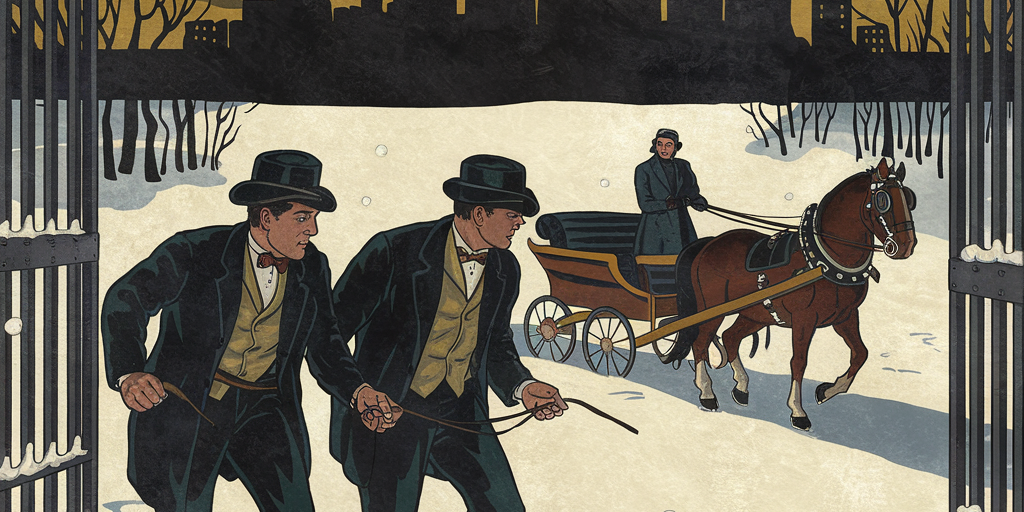Introduction: Crime, Escape, and Infamy in the Steel City
Long before organized crime syndicates took root in American cities, Pittsburgh witnessed one of the most dramatic criminal sagas in its history — the story of The Biddle Boys. Brothers Ed and Jack Biddle, born into poverty, would rise to infamy as bank robbers, murderers, and fugitives, captivating the city with their daring jailbreak and violent downfall.
Their tale, steeped in Gilded Age Pittsburgh’s grit and corruption, became a media sensation and cemented the Biddle Boys as the city’s most notorious outlaws.
Early Lives: Poverty and Petty Crime
Born in the late 19th century in Sharpsburg, Pennsylvania, Ed and Jack Biddle grew up along the rough industrial edges of Pittsburgh. The brothers came of age in a city booming from steel but rife with poverty, labor unrest, and political corruption.
Both started as petty criminals — burglaries, theft, and small-time cons — but their crimes grew bolder as they realized that banks, payroll trains, and gambling dens held far richer rewards.
Escalation to Violence and Murder
By 1901, the Biddle Brothers had assembled a small gang and embarked on a string of robberies across western Pennsylvania. Their crime spree culminated in the murder of Detective Charles “Chal” Schwab, who had trailed the brothers to a hotel near Butler, Pennsylvania.
When Schwab confronted the Biddles, they shot him dead — instantly becoming wanted men across the state. Their fate was sealed. Captured soon after, the Biddles were sentenced to death and locked away in Pittsburgh’s Allegheny County Jail — then known as “The Bastille.”
The Infamous Jailbreak: Seduction and Scandal
The Biddle Boys’ story might have ended on death row, but it took a sensational turn thanks to a young woman named Katherine Soffel, the wife of Warden Peter Soffel.
Katherine, bored and fascinated by the outlaw brothers — particularly Ed — began secretly visiting their cell. Over weeks, what began as curiosity morphed into a forbidden romance.
By January 1902, Katherine had smuggled saws and pistols into the jail, hidden under her skirts. On the snowy morning of January 30, 1902, Ed and Jack overpowered their guards and escaped — with Katherine driving their stolen sleigh.
The scandal gripped Pittsburgh: a respectable warden’s wife helping two condemned murderers flee. Newspapers across the country printed the story, portraying Katherine as either a love-struck fool or a willing accomplice.
The Final Chase and Bloody End
The trio fled north, aiming for the Canadian border. For two days, they braved snow-covered hills and frozen rivers, but their journey ended near Butler County, Pennsylvania.
Cornered by a posse of lawmen, the Biddles refused to surrender. In the ensuing gunfight, Jack was killed instantly. Ed, mortally wounded, lingered long enough to die in a farmhouse a few hours later.
Katherine Soffel was captured alive and returned to Pittsburgh in chains, where crowds gathered to see the “fallen woman.” She was tried, convicted of aiding the escape, and sentenced to two years in prison — a light sentence that shocked many.
Legacy: Pittsburgh’s First Celebrity Crime Story
The Biddle Boys’ saga was the O.J. Simpson trial of its time — covered relentlessly by newspapers, turned into pulp novels, stage plays, and later, silent films.
Their jailbreak exposed the flaws in Pittsburgh’s justice system and embarrassed the city’s elite. The Allegheny County Jail never fully recovered its reputation.
Katherine Soffel faded into obscurity after serving her sentence, reportedly moving west and dying alone. The Biddles became folk legends — part of Pittsburgh’s criminal folklore, remembered not just for their crimes but for the sensational love affair that sealed their fate.
Conclusion: The Dark Romance of Crime and Consequence
The story of the Biddle Boys is more than a crime saga — it’s a glimpse into the heart of early 20th-century Pittsburgh, where wealth and desperation collided, and law and order could be undone by love.
Today, the old Allegheny County Jail still stands, its stone walls holding the echoes of Ed and Jack Biddle. Their tale remains a timeless Pittsburgh legend — a story of crime, love, betrayal, and inevitable ruin.
More Mobsters, Jailbreaks, and Legendary Crimes
The Biddle Boys were just the beginning. Explore our complete Pittsburgh Mafia & Crime History collection to meet the mob bosses, bootleggers, and outlaws who built the Steel City’s criminal legacy.
From daring escapes to mafia feuds and Prohibition power grabs, this hub reveals the true underworld that once ruled Pittsburgh’s streets.
Explore the Full Crime History →








